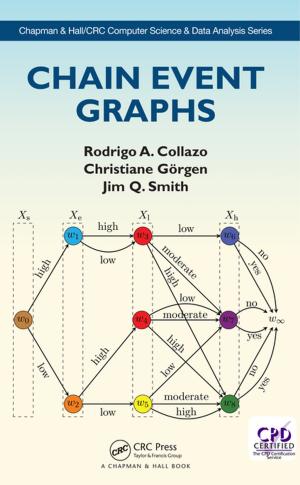Adaptive Filtering
Fundamentals of Least Mean Squares with MATLAB®
Nonfiction, Science & Nature, Technology, Electricity, Mathematics, Statistics| Author: | Alexander D. Poularikas | ISBN: | 9781351831024 |
| Publisher: | CRC Press | Publication: | December 19, 2017 |
| Imprint: | CRC Press | Language: | English |
| Author: | Alexander D. Poularikas |
| ISBN: | 9781351831024 |
| Publisher: | CRC Press |
| Publication: | December 19, 2017 |
| Imprint: | CRC Press |
| Language: | English |
Adaptive filters are used in many diverse applications, appearing in everything from military instruments to cellphones and home appliances. Adaptive Filtering: Fundamentals of Least Mean Squares with MATLAB® covers the core concepts of this important field, focusing on a vital part of the statistical signal processing area—the least mean square (LMS) adaptive filter.
This largely self-contained text:
- Discusses random variables, stochastic processes, vectors, matrices, determinants, discrete random signals, and probability distributions
- Explains how to find the eigenvalues and eigenvectors of a matrix and the properties of the error surfaces
- Explores the Wiener filter and its practical uses, details the steepest descent method, and develops the Newton’s algorithm
- Addresses the basics of the LMS adaptive filter algorithm**,** considers LMS adaptive filter variants, and provides numerous examples
- Delivers a concise introduction to MATLAB®, supplying problems, computer experiments, and more than 110 functions and script files
Featuring robust appendices complete with mathematical tables and formulas, Adaptive Filtering: Fundamentals of Least Mean Squares with MATLAB® clearly describes the key principles of adaptive filtering and effectively demonstrates how to apply them to solve real-world problems.
Adaptive filters are used in many diverse applications, appearing in everything from military instruments to cellphones and home appliances. Adaptive Filtering: Fundamentals of Least Mean Squares with MATLAB® covers the core concepts of this important field, focusing on a vital part of the statistical signal processing area—the least mean square (LMS) adaptive filter.
This largely self-contained text:
- Discusses random variables, stochastic processes, vectors, matrices, determinants, discrete random signals, and probability distributions
- Explains how to find the eigenvalues and eigenvectors of a matrix and the properties of the error surfaces
- Explores the Wiener filter and its practical uses, details the steepest descent method, and develops the Newton’s algorithm
- Addresses the basics of the LMS adaptive filter algorithm**,** considers LMS adaptive filter variants, and provides numerous examples
- Delivers a concise introduction to MATLAB®, supplying problems, computer experiments, and more than 110 functions and script files
Featuring robust appendices complete with mathematical tables and formulas, Adaptive Filtering: Fundamentals of Least Mean Squares with MATLAB® clearly describes the key principles of adaptive filtering and effectively demonstrates how to apply them to solve real-world problems.















